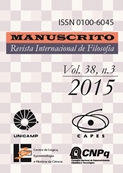Resumo
Pretendemos aqui analisar o texto de República V, 478e-480a, em que Platão argumenta contra um adversário que rejeita a teoria das Formas e restringe o domínio do conhecimento a itens sensíveis. O argumento de Platão conclui que seu adversário não pode ter conhecimento, mas somente opinião. O raciocínio baseia-se em uma premissa que afirma que os objetos sensíveis, ao contrário das Formas, estariam submetidos a uma certa copresença de atributos opostos. Apresentamos uma versão do argumento visando dois propósitos centrais: por um lado, buscamos resolver certas dificuldades textuais e teóricas que o leitor da passagem tem de enfrentar; por outro, evitamos comprometer Platão com a tese de que os itens sensíveis estão excluídos do domínio do conhecimento. Nossa estratégia envolve argumentar que a passagem assume um esquema conceitual que não é o de Platão, mas o de seu adversário.
Abstract:
We intend to analyse the text of Republic V, 478e-480a, in which Plato argues against an opponent who rejects the theory of Forms and confines the domain of knowledge to sensible items. Plato’s argument concludes that his opponent cannot have knowledge, but only opinion. The reasoning relies on a premise stating that the sensible objects, unlike the Forms, suffer a certain compresence of opposite attributes. We present a version of the argument with two aims in mind: on one hand, we intend to solve a set of textual and theoretical difficulties that the reader of the passage has to face; on the other, we avoid committing Plato to the thesis that sensible items are excluded from the domain of knowledge. Our strategy involves arguing that the passage assumes a conceptual framework that belongs not to Plato, but to his opponent.
Keywords: Plato. Forms. Ontology. Epistemology
Referências
SLINGS, S.R. (ed.) Platonis Rempublicam. Oxonii: E Typographeo Clarendoniano, 2003.
DUKE, E. A., HICKEN, W. F., NICOLL, W. S. M., & ROBINSON, D. B. (eds.) Platonis Opera, tomus I. Oxonii: E Typographeo Clarendoniano, 1995. ALLEN, R.E. “The Argument from Opposites in Republic V” Review of Metaphysics 15 (2), pp. 325-335, 1961.
ANNAS, J. An introduction to Plato's Republic. Oxford: Oxford University Press, 1981.
ANGIONI, L. “Conhecimento Científico no Livro I dos Segundos Analíticos de Aristóteles” Journal of Ancient Philosophy Vol. 1 (2), 2007.
BOSTOCK, D. Plato's Theaetetus. Oxford University Press, 1988.
––––––. Plato's Phaedo. Oxford University Press, 1986.
BRENTLINGER, J. “Incomplete Predicates and the Two-World Theory of the Phaedo” Phronesis, Vol. 17, No. 1, pp. 61-79, 1972.
BURNYEAT, M. The Theaetetus of Plato, with a translation by M. J. Levett, revised by Myles Burnyeat. Indianapolis and Cambridge, MA: Hackett, 1990.
CASTAÑEDA, H. N. “Plato’s Phaedo Theory of Relations” Journal of Philosophical Logic 1, (1972), 467-480, 1972.
FINE, G. (ed.) Plato 1: Metaphysics and Epistemology. Oxford Readings in Philosophy. Oxford: Oxford University Press, 1999.
––––––. (ed.) Plato on Knowledge and Forms: Selected Essays. Oxford: Oxford University Press, 2003a.
––––––. “Knowledge and Belief in Republic V” In: FINE, G. Plato on Knowledge and Forms: Selected Essays. Oxford: Oxford University Press, pp. 66-85, 2003b.
––––––. “Knowledge and Belief in Republic V-VII” In: FINE, G. Plato on Knowledge and Forms: Selected Essays. Oxford: Oxford University Press, pp. 85-117, 2003c.
GALLOP, D. Plato: Phaedo. Clarendon Plato Series. Oxford: Clarendon Press, 1975.
GEACH, P.T. “Good and Evil” Analysis 17 (2), pp. 33-42, 1956.
GOSLING, J. “Republic Book V: Τὰ Πολλὰ Καλά etc.” Phronesis, Vol. 5, No. 2, pp. 116-128, 1960.
IRWIN, T.H. “Plato's Heracleiteanism” Philosophical Quarterly 27 (106), pp. 1-13, 1967.
––––––. “The Theory of Forms” In: FINE, G. (ed.) Plato 1: Metaphysics and Epistemology. Oxford Readings in Philosophy. Oxford: Oxford University Press, 1999.
KIRWAN, C. “Plato and Relativity” Phronesis, Vol. 19, No. 2, pp. 112-129, 1971.
MATTHEN, M. “Plato's Treatment of Relational Statements in the Phaedo” Phronesis, Vol. 27, No. 1, pp. 90-100, 1982.
MCDOWELL, J. Plato: Theaetetus. Clarendon Press, 1973.
MILLS, K.W. “Plato's Phaedo, 74b7-c6” Phronesis, Vol. 2, No. 2, pp. 128-147, 1957.
MURPHY, N. R. The Interpretation of Plato's Republic. Oxford: Clarendon. Press, 1951.
NEHAMAS, A. “Plato on the Imperfection of the Sensible World” In: FINE, G. (ed.) Plato 1: Metaphysics and Epistemology. Oxford Readings in Philosophy. Oxford: Oxford University Press, 1999.
OWEN, G.E.L. “A Proof in the Peri Ideon” Journal of Hellenic Studies Pt. 1, pp.103- 11, 1957.
QUINE, W.V.O. Word and Object. Cambridge: MA- MIT Press, 1960.
ROSS, W. D. Plato's Theory of Ideas. Oxford: Clarendon Press, 1951.
SHIELDS, C. Classical Philosophy: A Contemporary Introduction London: Routledge, 2003.
SVAVARSSON, S. H. “Plato on Forms and Conflicting Appearances: the argument of Phaedo 74a9-c6” The Classical Quarterly, 59, pp. 60-74, 2009.
VLASTOS, G. Platonic Studies. Princeton: Princeton University Press, 1973a.
––––––. “Degrees of Reality in Plato”. In: VLASTOS, G. Platonic Studies. Princeton: Princeton University Press, pp. 58-76, 1973b.
––––––. “Reasons and Causes in the Phaedo”. In: VLASTOS, G. Platonic Studies. Princeton: Princeton University Press, pp. 76-111, 1973c.
WHITE, F.C. “J. Gosling on Τὰ Πολλὰ Καλά.” Phronesis 23 (2), pp. 127-132, 1978.
ZUPPOLINI, B. A. “Forma Lógica das Proposições Científicas e Ontologia da Predicação: um falso dilema nos Segundos Analíticos de Aristóteles.” Philósophos, v. 19, p. 11-45, 2014.

